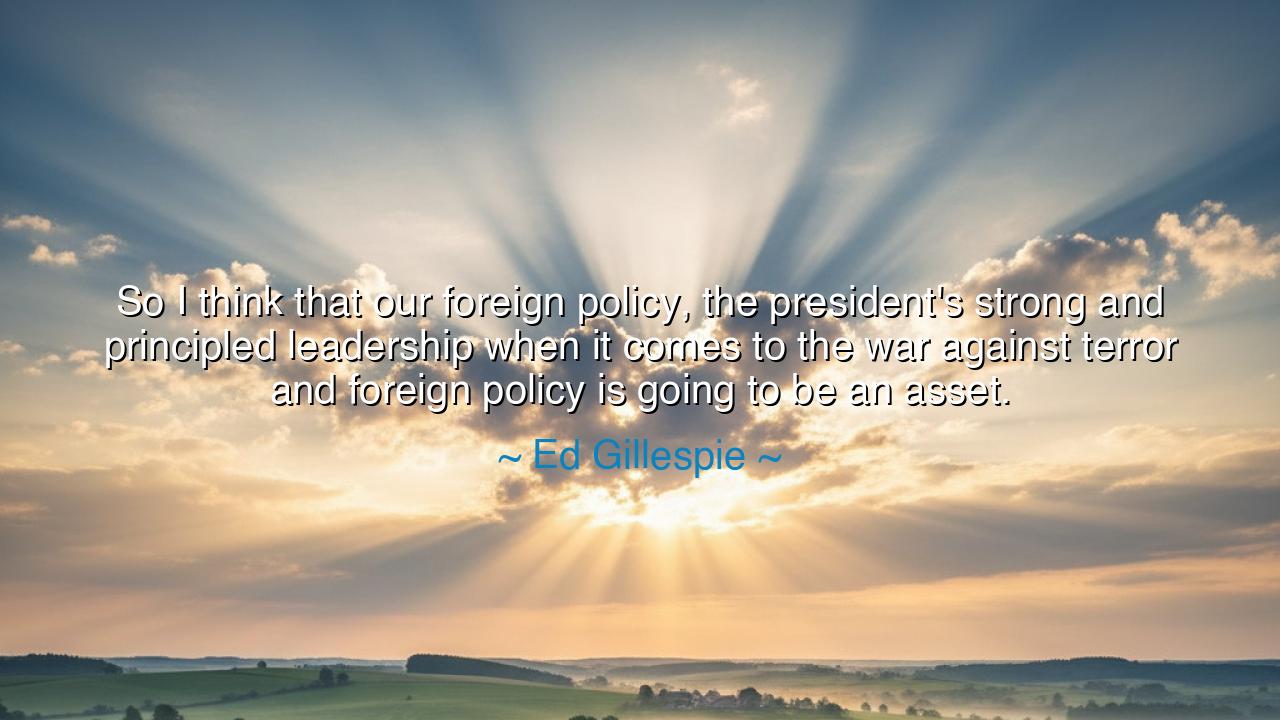
So I think that our foreign policy, the president's strong and
So I think that our foreign policy, the president's strong and principled leadership when it comes to the war against terror and foreign policy is going to be an asset.






The words of Ed Gillespie—“So I think that our foreign policy, the president's strong and principled leadership when it comes to the war against terror and foreign policy is going to be an asset.”—reflect the conviction that in times of danger, the steadiness of a leader and the clarity of a nation’s direction in the world can become not a burden but a strength. Spoken in the wake of turmoil, they remind us that foreign policy is not mere diplomacy, nor the cold shifting of treaties and alliances, but the shield and compass by which a nation secures its people and shapes its destiny. When the storms of fear and violence rage, the measure of a leader is not in hesitation, but in principled resolve.
To speak of strong and principled leadership is to summon the ideal of the just ruler, one who does not bow to convenience nor shrink before peril. For in the age after the towers fell and the specter of terror spread across the earth, the eyes of nations looked to their leaders to stand firm. Gillespie’s words arise from that crucible, where the war against terror was not only a clash of armies but a test of moral strength. A leader who acts without principle brings ruin; a leader who wields strength with justice becomes a bulwark for his people.
History offers us echoes of this truth. Consider the days of Winston Churchill, when Britain stood nearly alone against the rising tide of tyranny. It was not only planes and ships that sustained the island in those dark days, but the voice of a man who declared with unyielding certainty that Britain would fight on, no matter the cost. His foreign policy, built on alliances and relentless resistance, became not weakness but strength, not burden but asset. The people, hearing the steadfastness of his words, found courage for themselves. So too do Gillespie’s words remind us that in foreign policy, principle and strength are treasures beyond gold, for they kindle resolve in both citizens and allies.
Yet let us not mistake the meaning. To call leadership an asset is not to glorify war, but to recognize that in the harsh realities of global strife, clarity and conviction prevent chaos. Nations that waver invite their enemies to press harder; nations that speak with one voice and act with steady hand become as mountains, difficult to shake. The war against terror was not fought only with weapons, but with messages, alliances, and the projection of will. In such a contest, strong and principled leadership was indeed not a burden, but the very foundation of survival.
At the same time, we must remember that principles must guide strength, lest strength devour itself. History has shown that when nations pursue power without moral compass, they sow destruction for themselves and others. The wars of empire, fought for greed rather than justice, serve as warning. Thus, Gillespie’s emphasis on principled leadership is vital: it is not raw force that serves as an asset, but force guided by honor, justice, and a vision for peace. Without principle, strength becomes tyranny; with principle, strength becomes protection.
The lesson, therefore, is clear. Whether in nations or in the lives of individuals, leadership rooted in principle is the surest foundation in times of trial. Do not be swayed by fear or seduced by expedience. Build your choices upon justice, and let your actions be strong enough to endure the storm. For in the household, in the workplace, in the community, as in the affairs of nations, it is principled leadership that transforms burden into blessing, and trial into triumph.
So, O listener, carry this teaching forward. When the world presses upon you with terror, with uncertainty, or with doubt, do not waver. Be strong, but not cruel; be principled, but not rigid. Let your leadership—whether over many or over yourself—be an asset to those around you, a source of stability in their fear, and of clarity in their confusion. For history honors those who lead with conviction, and time proves that such leadership leaves a legacy of strength not only for the present, but for generations to come.






AAdministratorAdministrator
Welcome, honored guests. Please leave a comment, we will respond soon